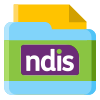
The Health & Wellbeing Plan is a comprehensive overview of a client’s health and wellbeing requirements. This plan will reference other supporting plans and looks at all the client’s health and being needs.
This plan is very important as it is used by medical staff to assess a client’s current level of care and to inform specialists of other specialists’ treatments the client may currently be undertaking. The plan also assists support staff in maintaining a consistent level of care as all care plans document the level of support required by the client. And as much as we don’t want to think about our love one being without us, as parents we don’t live forever and to ensure that the client’s care level is maintained having it documented makes the transition to a care facility or having drop in home care supports a lot easier as all the client’s care is documented.

The Health & Wellbeing Plan is a comprehensive overview of a client’s health and wellbeing requirements. This plan will reference other supporting plans and looks at all the client’s health and being needs.
This plan is very important as it is used by medical staff to assess a client’s current level of care and to inform specialists of other specialists’ treatments the client may currently be undertaking.
The plan also assists support staff in maintaining a consistent level of care as all care plans document the level of support required by the client. And as much as we don’t want to think about our love one being without us, as parents we don’t live forever and to ensure that the client’s care level is maintained having it documented makes the transition to a care facility or having drop in home care supports a lot easier as all the client’s care is documented.
An important reason for having a comprehensive health & wellbeing plan is when applying for NDIS funding you are required to show evidence to support your funding requests. This plan outlines the current and past strategies and treatments a client has undertaken and can show the impact of not having the interventions in place therefore maximising your opportunity for funding through NDIS.
This is a very comprehensive document, and the plan will change as the client’s care and health needs change over time. By this I mean that as a client’s needs change so does this document. This document often comprises of other smaller supporting plans. This plan comprises of a client medical history and doctors and specialists’ reports are collected in this folder/plan.
A client’s health and wellbeing plan outlines the clients, medical conditions, who they see for those medical conditions, who gives consent for medical interventions, immunisation records, hearing, eyesight, skin check, thyroid etc checks are all listed. The annual health checklist forms part of this plan and is updated every year when the client attends their annual check-up.
This document will include any care plans from specialists and GP for a client. Examples of such plans would be: Dental Care Plan, epilepsy management plan, allergic reaction plan etc.
This plan keeps a record of a client’s medical history so if a support worker is asked to take a client to a medical appointment a lot of the information they will be asked will be found in this document.

An important reason for having a comprehensive health & wellbeing plan is when applying for NDIS funding you are required to show evidence to support your funding requests. This plan outlines the current and past strategies and treatments a client has undertaken and can show the impact of not having the interventions in place therefore maximising your opportunity for funding through NDIS.

This is a very comprehensive document, and the plan will change as the client’s care and health needs change over time. By this I mean that as a client’s needs change so does this document. This document often comprises of other smaller supporting plans. This plan comprises of a client medical history and doctors and specialists’ reports are collected in this folder/plan.
A client’s health and wellbeing plan outlines the clients, medical conditions, who they see for those medical conditions, who gives consent for medical interventions, immunisation records, hearing, eyesight, skin check, thyroid etc checks are all listed. The annual health checklist forms part of this plan and is updated every year when the client attends their annual check-up.
This document will include any care plans from specialists and GP for a client. Examples of such plans would be: Dental Care Plan, epilepsy management plan, allergic reaction plan etc.
This plan keeps a record of a client’s medical history so if a support worker is asked to take a client to a medical appointment a lot of the information they will be asked will be found in this document.
We can assist you with all your case management needs and can help you maxmize your funding you receive from your NDIS Plan

In the event of a medical emergency a client’s care plans and case management form an excellent resource for medical staff to treat a client. The care plans outline what care a client is currently receiving and a client’s medical history.

Plans document what treatments have been implemented for a client both their current interventions as well as past interventions. This assists medical and other specialists in determining a treatment plan for the client. It informs them on what worked for the client previously and what has not worked.

By having the client’s care requirements documented it also provides the information to medical and other specialists on the other treatments a client may be receiving from another specialist. This means that all specialists are working collaboratively to provide the best quality of care for the client.

The care plans and data collection process are an excellent source of information that can be provided as supporting evidence for a claim under a client’s NDIS Plan.

It outlines the client’s current care requirements. It informs care staff on what conditions the client has and how they need to manage the client’s care.
